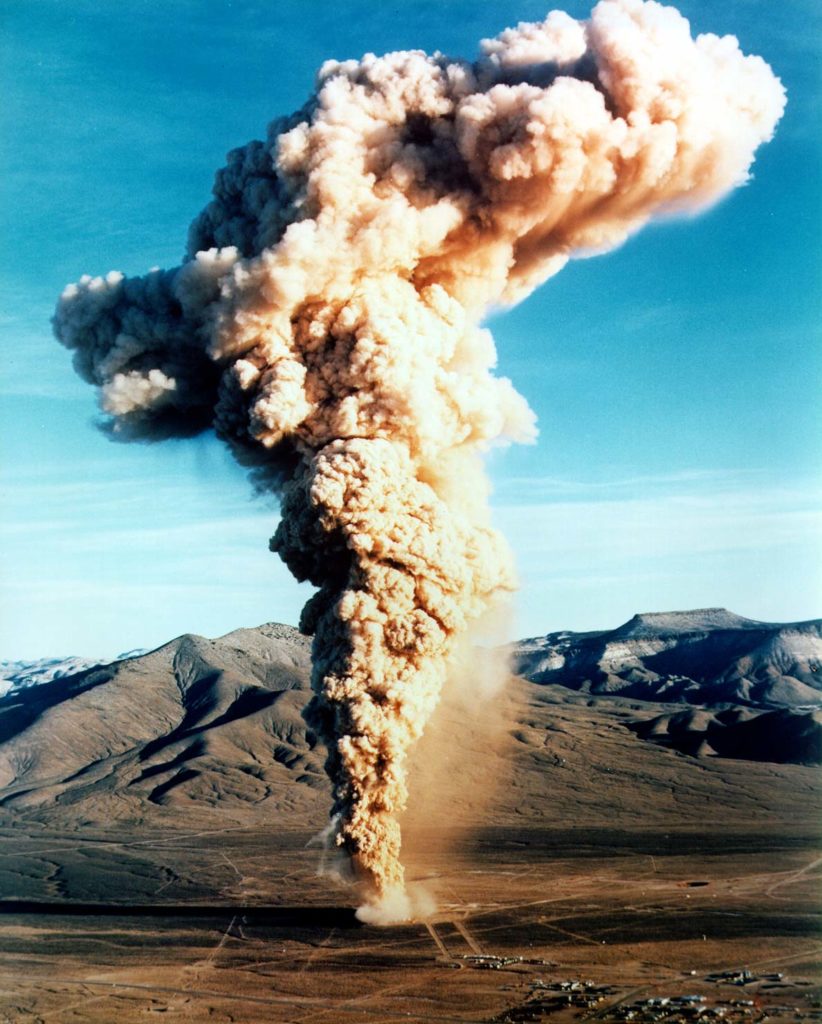
With all of the chaos surrounding the U.S. presidential election, word of the Trump administration and Senate Republicans creating legislation to prepare to resume nuclear weapons testing at the Nevada Test Site hasn’t received much public attention.
When he learned about the Senate bill in May, Rep. Ben McAdams (D-Utah) said he supported a bill introduced by two Nevada representatives in the House in June prohibiting any tax dollars from being spent on nuclear weapons testing.
McAdams said he knew it was something that the House of Representatives must put a stop to for the health and safety of Utah.
“The Senate legislation put millions of dollars to prepare for restarting nuclear testing and the House version (of the bill), thanks to my amendment, prohibits it,” McAdams said.
With the election less than a month away, McAdams said these conflicting bills don’t have a set time to be reconciled, however the nuclear weapons testing could possibly be “ready to go in a few months.”
Republican Burgess Owens, who is McAdams’ opponent in the upcoming election, has publicly said he would support the Trump administration’s preparations to resume nuclear weapons test.
McAdams said Utah has had more than a thousand nuclear bombs tested in its backyard at the Nevada Test Site from the 1950s through 1992. He further explained that the government assured the tests were safe and even encouraged people to go on family picnics to watch the nuclear weapons test.
“And what we now know is that those tests spread fallout (radioactive material) across the entire state of Utah. The government knew it at the time and lied to us, and tens of thousands of Utahns developed cancer and died as a result of those lies,” McAdams said.
He said nuclear weapons testing can result in cancer, birth defects and infertility and thousands of cases in Utah have directly corresponded to the past nuclear weapons testing.
Clark Snelgrove, who has a PhD in STEM curriculum and is the BYU physics lecture demonstration coordinator, said the nuclear weapons testing done at the Nevada Test Site might have affected those immediately exposed, but it’s not continuing to cause ill effects on anyone.
“That’s just not scientifically valid. No one should be being hurt anymore. Whatever is left is all decayed away or it’s so broadly dispersed that it’s in the noise now,” Snelgrove said.
Although he doesn’t completely agree nuclear weapons testing should happen again, he doesn’t believe that it is a threat to national security. Snelgrove said many countries participate in nuclear weapons testing because they want to strengthen their political position, where the U.S. doesn’t need to increase their already strong standing.
“If they can get a nuclear weapon they will have the same kind of bargaining power on the international playing field as other countries who do have nuclear weapons. So that’s really the only motivation.”
When McAdams was asked if the U.S. will be set back due to opting out of nuclear weapons testing, he said national security experts have assured citizens that the nuclear arsenal is an adequate deterrent and does not need to be tested in a bomb.
“When we start testing them other countries are going to feel the need to do the same. And they’re not going to feel bound by treaties and other restrictions on nuclear weapons testing so it actually may be destabilizing and result in a really high risk to our national security,” McAdams said.
Logan Brown, secretary of BYU’s chapter of the American Nuclear Society, said he doesn’t think the health of Utahns is the biggest concern with nuclear weapons testing. Brown said the biggest concern would be the tension it would create between the U.S. and other countries.
“I would have full confidence that the national labs would do it safely. I don’t think health concerns would be a big issue. It would just be the nuclear proliferation issues with other countries kind of seeing the U.S. as an example and then they would start doing it as well.”




